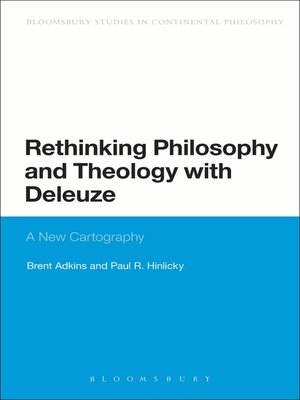Rethinking Philosophy and Theology with Deleuze
ebook ∣ A New Cartography · Bloomsbury Studies in Continental Philosophy
By Brent Adkins

Sign up to save your library
With an OverDrive account, you can save your favorite libraries for at-a-glance information about availability. Find out more about OverDrive accounts.
Find this title in Libby, the library reading app by OverDrive.



Search for a digital library with this title
Title found at these libraries:
| Library Name | Distance |
|---|---|
| Loading... |
The debate between faith and reason has been a dominant feature of Western thought for more than two millennia. This book takes up the problem of the relation between philosophy and theology and proposes that this relation can be reconceived if both philosophy and theology are seen as different ways of organising affects.
Brent Adkins and Paul R. Hinlicky break new ground in this timely debate in two ways. Firstly, they lay bare the contemporary dependence on Kant and propose that our Kantian inheritance leaves us with an insuperable dualism. Secondly, the authors argue that the philosophy of Gilles Deleuze provides a way of resolving the debate between faith and reason that does justice to philosophy and theology by reconceiving of both as assemblages. Deleuze's philosophy differentiates domains of thought in terms of what they create. This seems like a particularly fruitful way to pursue the problem of the relations among philosophy and theology because it allows their distinction without at the same time placing them in opposition to one another.
Brent Adkins and Paul R. Hinlicky break new ground in this timely debate in two ways. Firstly, they lay bare the contemporary dependence on Kant and propose that our Kantian inheritance leaves us with an insuperable dualism. Secondly, the authors argue that the philosophy of Gilles Deleuze provides a way of resolving the debate between faith and reason that does justice to philosophy and theology by reconceiving of both as assemblages. Deleuze's philosophy differentiates domains of thought in terms of what they create. This seems like a particularly fruitful way to pursue the problem of the relations among philosophy and theology because it allows their distinction without at the same time placing them in opposition to one another.







